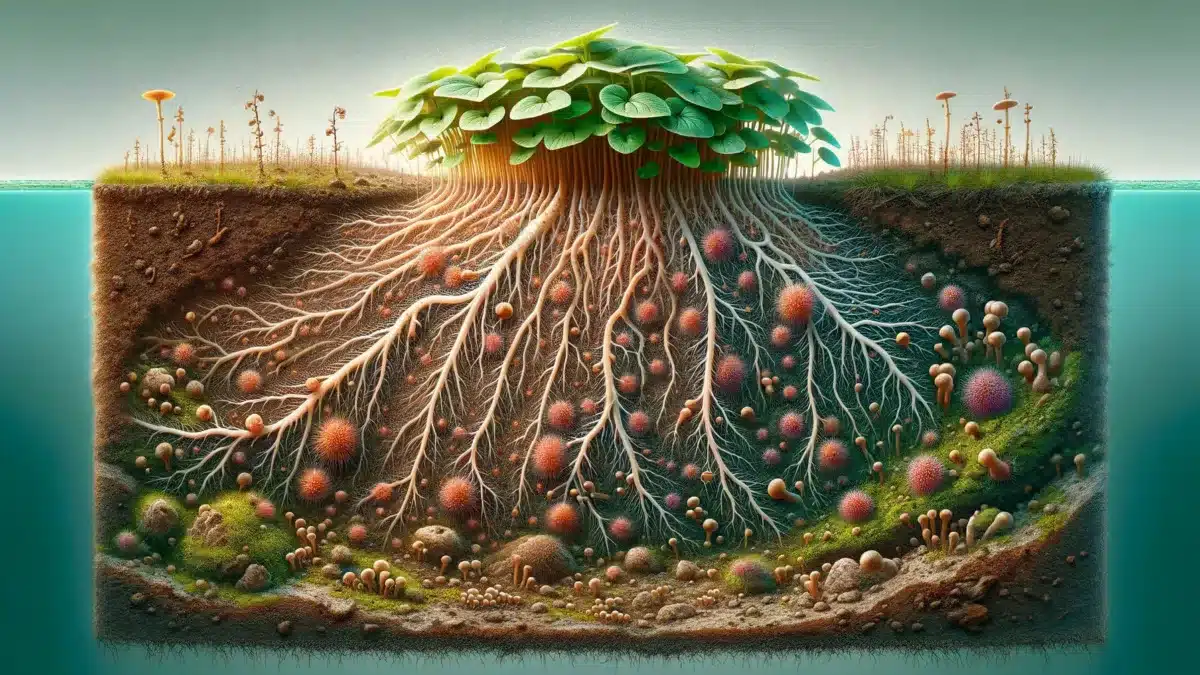Welcome to the fascinating world beneath our feet – a world where tiny fungi play a monumental role in the health and prosperity of our gardens. Mycorrhizal fungi, often unseen and overlooked, are essential partners to many plants, forming symbiotic relationships that benefit both parties. In this post, we’ll dive into the world of mycorrhizae and discover how these microscopic allies can significantly impact our gardening practices.
Understanding Mycorrhizae
Mycorrhizae come in two primary types: Ectomycorrhizae, which form a sheath around plant roots, and Endomycorrhizae, which penetrate the root cells. While they function differently, both types assist plants in absorbing water and nutrients, particularly phosphorus and nitrogen. They also enhance plant resistance to diseases and environmental stresses, such as drought.
Identifying Mycorrhizal Activity in Your Garden
You might wonder how to tell if mycorrhizal fungi are at work in your garden. Look for robust plant growth, particularly in nutrient-poor soils, as a key indicator. These fungi thrive in undisturbed soils rich in organic matter. Plants with mycorrhizal associations generally have improved water efficiency and vigor. But these are only very rough indicators. If you really wanted to get sure, you would need to make an biological soil test and those can be quite expensive.
“Piedmont Master Gardeners” provides a very practical approach
Do a practical test next spring, such as treating potatoe, tomato, pepper and lettuce crop with mycorrhizal fungi and monitor the difference between the inoculated and the non-inoculated crops. If the inoculated plants are more productive than untreated plants, then it becomes obvious. I have a mycorrhizal fungi deficiency in my garden.
Since you might be interested in getting some mycorrhizal in your garden anyway, thats a good approach in my eyes 😀
Encouraging Mycorrhizal Development
To foster mycorrhizal development, choose plants that form these symbiotic relationships. Most plants do actually. Tomatoes, Potatoes, carrots, watermelons, pepper, herbs, onions or okra are just some of the edibles that flourish with mycorrhizahl. Beets, broccoli, Brussels sprouts or cabbage on the other hand do not benefit from adding mycorrhizal. Adding organic matter to your soil and minimizing disturbance (like tilling) creates an ideal environment for these fungi. Also, maintaining a slightly acidic to neutral pH and ensuring good soil structure can encourage mycorrhizal growth.
Mycorrhizae and Sustainable Gardening
Incorporating mycorrhizae into your gardening practices can lead to a more sustainable ecosystem. You can order these little helpers as powder from different online shops or your local garden supplier. These fungi reduce the need for chemical fertilizers and enhance plant resilience against pests and diseases, reducing pesticide reliance. Over time, a garden rich in mycorrhizae becomes a self-sustaining environment, with improved soil structure and nutrient cycling.
Common Myths and Misconceptions
Despite their benefits, there are misconceptions about mycorrhizae. One common myth is that all fungi are harmful to plants. In reality, while some fungi cause diseases, mycorrhizal fungi are beneficial. Another misconception is that mycorrhizae can entirely replace fertilizers. While they significantly reduce fertilizer needs, they do not eliminate them entirely, especially in very nutrient-poor soils.
Conclusion
Understanding and harnessing the power of mycorrhizal fungi can revolutionize how we approach gardening. By supporting these hidden allies, gardeners can create more resilient, healthy, and productive gardens. Embrace these microscopic partners and watch as your garden thrives like never before.
Additional Resources
For those interested in diving deeper into the world of mycorrhizae, several books, documentaries, and online resources are available. Exploring these can provide you with a more comprehensive understanding of how these incredible fungi can benefit your garden.
I found this video by WhitepepperFarmshomestead very helpful
Also this article gives a very good overview about what mycorrhiza is and why it is useful.

